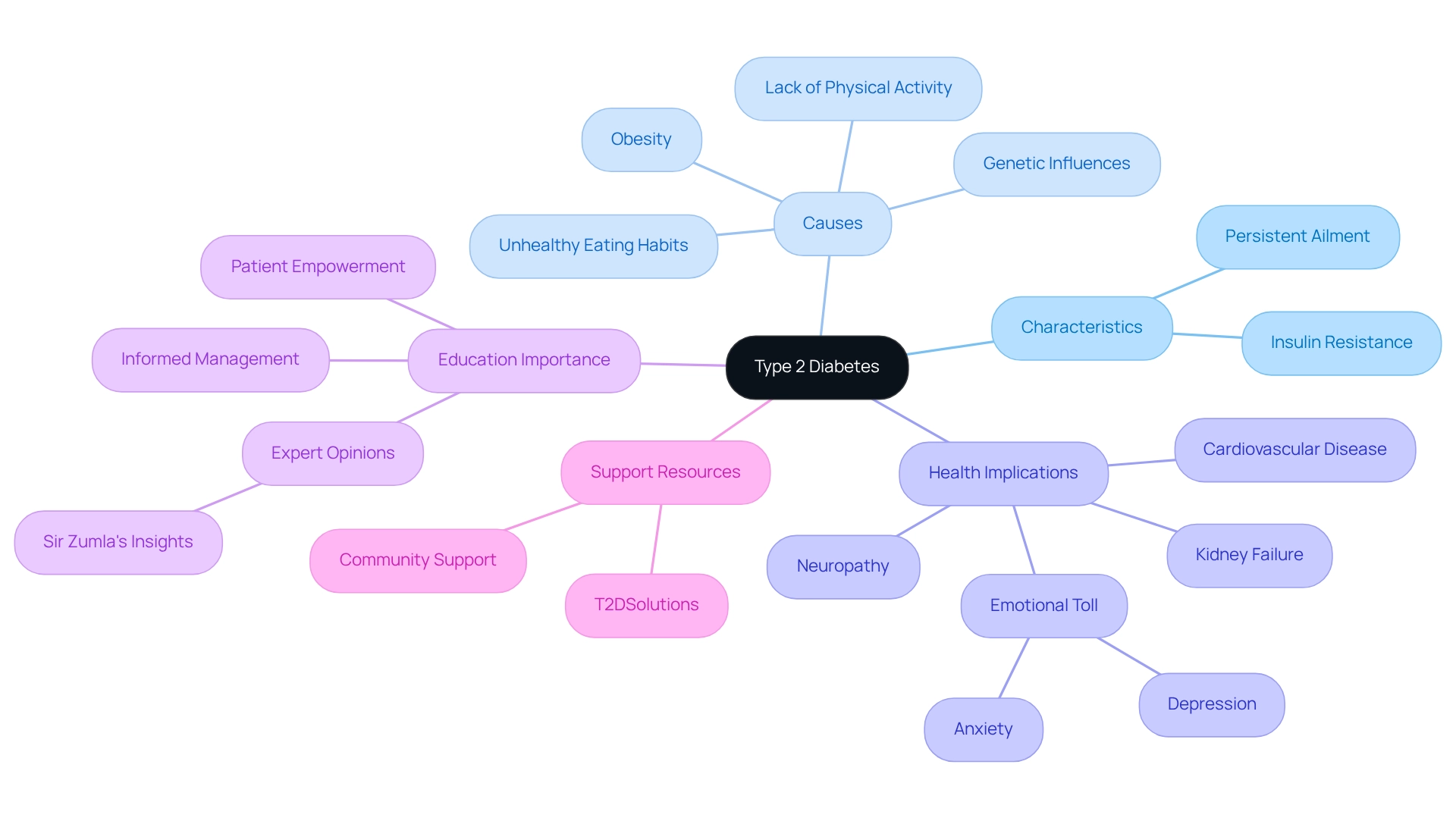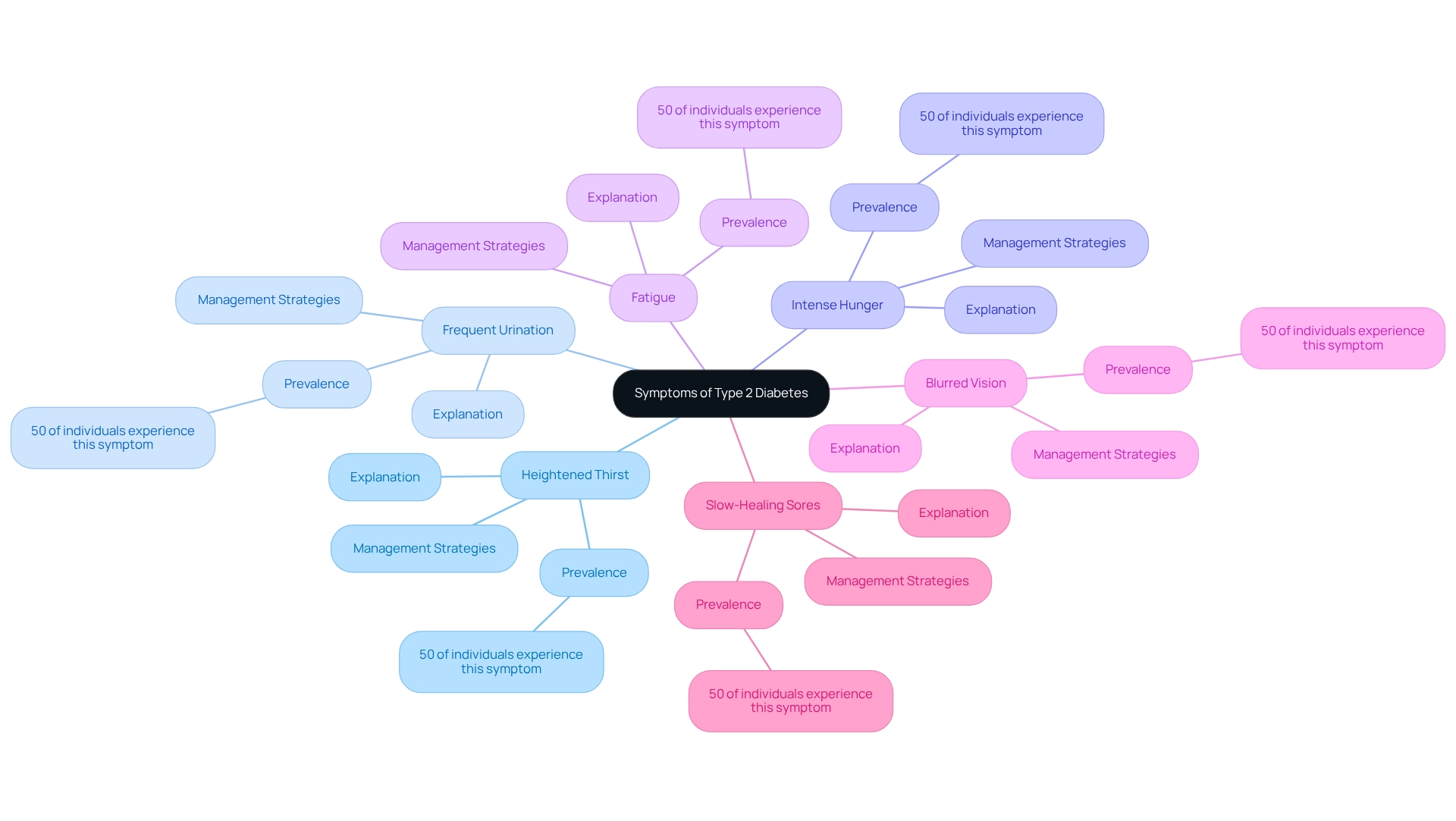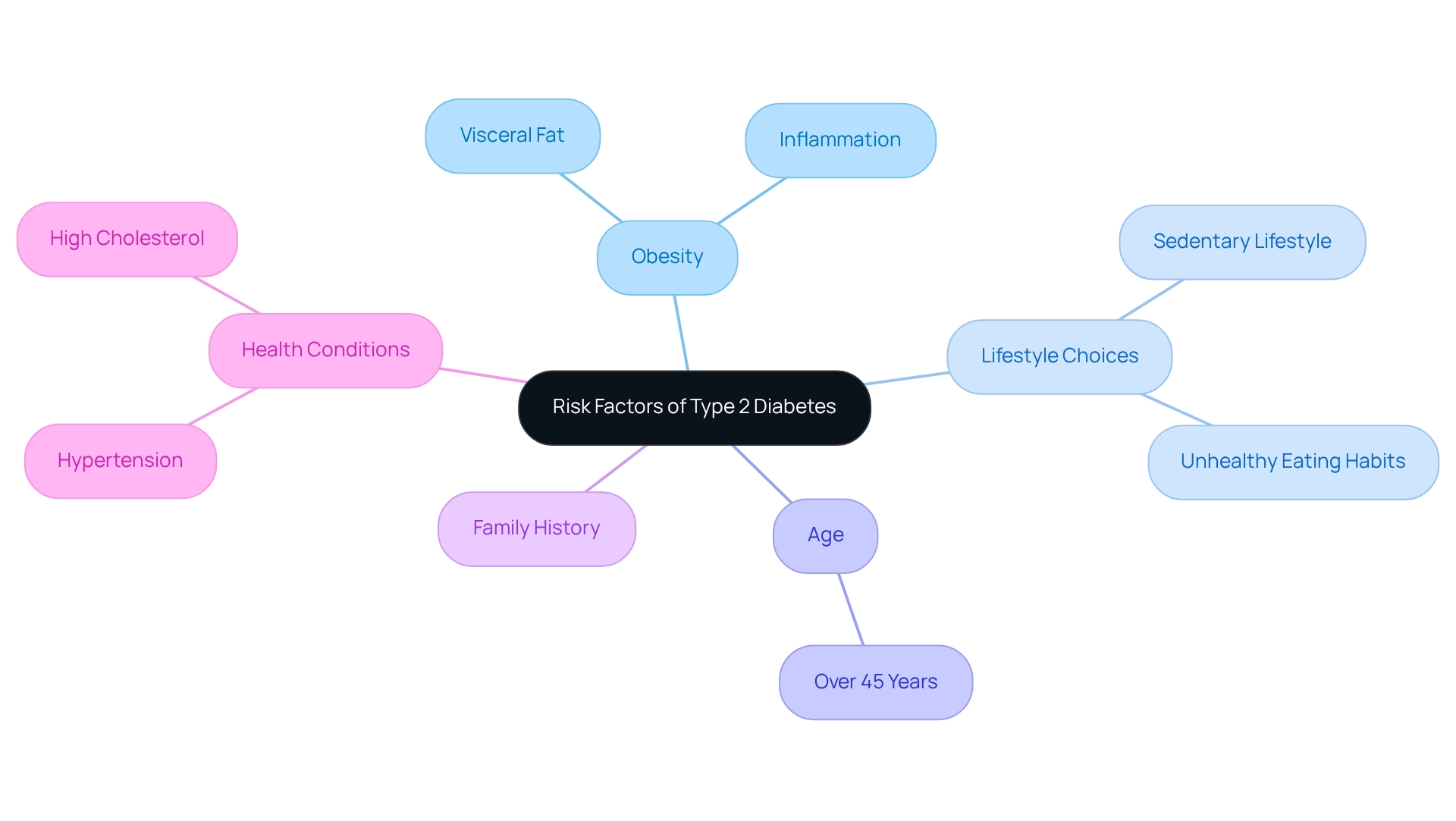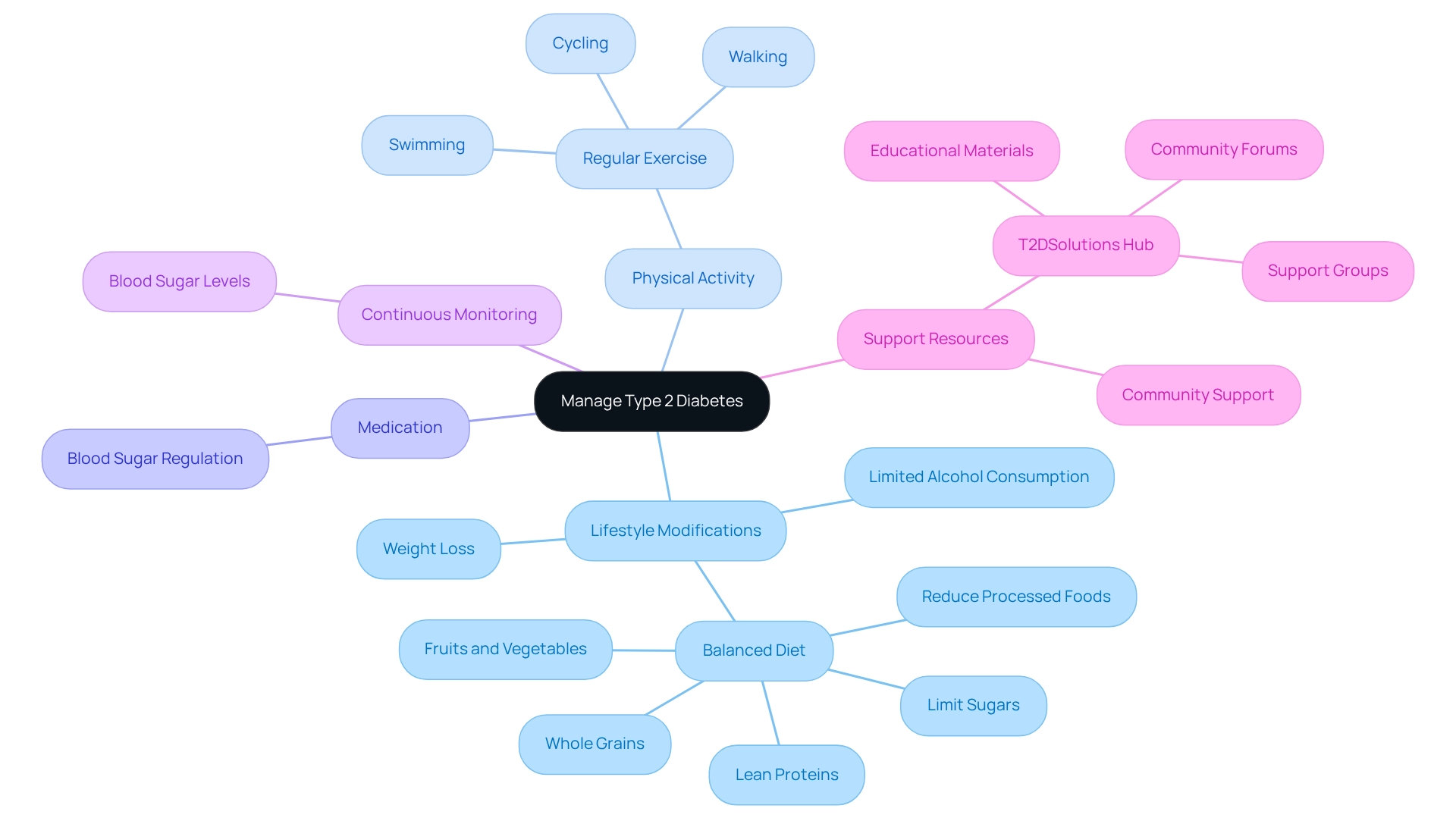Overview
Type 2 diabetes is a chronic condition that affects many individuals, characterized by insulin resistance. This leads to elevated blood sugar levels, often influenced by a combination of genetic factors and lifestyle choices such as obesity and inactivity. It's understandable to feel overwhelmed by this diagnosis, but understanding this disease is crucial for effective management and prevention.
Education and lifestyle modifications can significantly improve health outcomes for those affected. By learning more about Type 2 diabetes, you can take proactive steps toward better health. Remember, you're not alone in this journey; there are resources and support available to help you every step of the way.
We encourage you to seek out information and connect with others who share similar experiences. Together, we can foster a supportive community that empowers individuals to make informed choices and live healthier lives.
Introduction
In a world where Type 2 Diabetes is becoming increasingly common, understanding this chronic condition is more important than ever. Characterized by insulin resistance, Type 2 Diabetes affects millions of people around the globe. If left unmanaged, it can lead to serious health complications. It's understandable to feel overwhelmed as more individuals face this diagnosis. That’s why education and proactive management are crucial.
As new resources emerge, such as T2DSolutions, they aim to empower patients by providing the knowledge and support necessary to navigate the complexities of diabetes. This article will explore the nature of Type 2 Diabetes, its symptoms, causes, and effective management strategies. Together, we will highlight the crucial steps you can take to improve your health outcomes and enhance your quality of life. Remember, you're not alone in this journey; we are here to support you every step of the way.
Define Type 2 Diabetes: Understanding Its Nature and Importance
What's type 2 diabetes is a persistent ailment characterized by insulin resistance, where the body does not use insulin efficiently, resulting in increased blood sugar levels. Unlike the first form of diabetes, which is mainly autoimmune, what's type 2 diabetes typically develops from a mix of genetic influences and lifestyle choices, such as obesity, lack of physical activity, and unhealthy eating habits. This condition is of paramount importance, affecting millions worldwide and leading to severe health complications such as cardiovascular disease, kidney failure, and neuropathy.
Recent research highlights the increasing occurrence of this second type of sugar metabolism disorder, with worldwide data showing a notable surge in cases. For example, in Morocco, the Disability-Adjusted Life Years (DALY) count reached 559,000 in 2021, emphasizing the urgent need for effective control strategies. Understanding what's type 2 diabetes is essential for creating prevention and management strategies, making it a central concern for healthcare providers and patients alike.
As T2DSolutions launches as a new resource center for diabetes education and community support, it aims to empower newly diagnosed patients with comprehensive resources. Real-world instances illustrate the impact of this condition on health. For instance, a patient may find it challenging to manage their blood sugar levels while grappling with the emotional toll of their diagnosis, which can lead to anxiety and depression. Expert opinions emphasize the necessity of comprehensive education on what's type 2 diabetes, as informed patients are better equipped to manage their condition and mitigate risks associated with complications. Sir Zumla, a UK-NIHR Senior Investigator, stresses that "education is essential for enabling patients to take charge of their health and navigate the intricacies of managing their condition."
Furthermore, case studies on insulin resistance control reveal both strengths and limitations in current methodologies. The research titled "Methodological Strengths and Limitations of Diabetes Estimates" employs a strong evidentiary framework to generate location-specific estimates of blood sugar conditions but recognizes constraints such as dependence on non-validated self-reported information. This underscores the need for accurate and transparent health estimates to guide future research efforts.
In summary, understanding what's type 2 diabetes and the characteristics and consequences of this second type of condition is essential for effective oversight and prevention. As healthcare professionals advocate for increased awareness and education, T2DSolutions is committed to supporting this collective effort, ultimately leading to improved health outcomes and a better quality of life for those affected. You're not alone in this journey, and we are here to support you every step of the way.

Identify Symptoms: Recognizing the Signs of Type 2 Diabetes
If you or someone you know is facing the challenges of what's type 2 diabetes, it’s important to recognize the common symptoms. Heightened thirst, frequent urination, intense hunger, fatigue, blurred vision, and slow-healing sores can signal that the body is struggling to utilize glucose effectively. This can lead to elevated blood sugar levels, which may leave you feeling drained and overwhelmed. For instance, excessive thirst and urination occur as the kidneys work hard to filter out the excess glucose, while fatigue can stem from your body’s cells being deprived of the energy they need.
Recognizing these symptoms early is vital. Studies show that timely intervention can significantly prevent disease progression and reduce the risk of complications. Did you know that around 50% of individuals with what's type 2 diabetes experience these symptoms? This statistic emphasizes the necessity for awareness and proactive care. It’s understandable to feel a mix of emotions during this time, but know that effective organizational strategies, including lifestyle changes and education, can empower you to lead a full and active life despite your diagnosis.
As the ADA states, "If they manage their blood sugar levels well, many individuals with the condition can lead full, active lives." Resources like T2DSolutions serve as valuable hubs for newly diagnosed patients, offering educational materials and support to help manage symptoms and improve quality of life. Additionally, it’s essential to consider the financial implications of managing diabetes; medical costs for individuals with the condition are 2.3 times greater than for those without it.
A case study titled 'Managing Diabetes Effectively' illustrates that, despite the challenges, individuals can manage their health through comprehensive plans that include lifestyle changes and proper medical care. This highlights the importance of education and support in navigating your journey. Lastly, it’s crucial to acknowledge that people with diabetes are twice as likely to experience depression compared to those without the condition. This underscores the emotional and psychological aspects of living with diabetes, reminding us that you’re not alone in this journey. We are here to support you every step of the way.

Explore Causes: Understanding the Risk Factors and Mechanisms Behind Type 2 Diabetes
What's type 2 diabetes often arises from insulin resistance, which is a condition where the body's cells struggle to respond to insulin effectively. This resistance can be worsened by obesity, especially the buildup of visceral fat, which releases inflammatory substances that interfere with insulin signaling. It's concerning that obesity levels among teenagers aged 12 to 19 have steadily increased since 1988-1994, leading to a rise in certain health conditions within this group. Notably, non-Hispanic Black children and teenagers have shown the highest rates of this condition in various studies.
Other factors that contribute to this risk include:
- A sedentary lifestyle
- Unhealthy eating habits
- A family history of diabetes
Age also plays a crucial role, with individuals over 45 facing an increased risk. Additionally, conditions such as hypertension and high cholesterol can increase the likelihood of developing what's type 2 diabetes. As we look toward 2025, these risk factors remain critical, as the medical expenses associated with the condition have significantly risen, from $10,179 to $12,022 per individual between 2012 and 2022.
Understanding these causes is vital for implementing effective prevention strategies. The Centers for Disease Control and Prevention reminds us that "A health care professional can assess if an individual's health might be endangered due to their weight," highlighting the importance of monitoring weight in relation to blood sugar issues. Making lifestyle changes, such as following a balanced diet and increasing physical activity, can greatly reduce the risk of developing what's type 2 diabetes. Many individuals who have made these adjustments report improved health outcomes. In fact, in 2020, there were 202,000 emergency room visits for hypoglycemia among adults with high blood sugar, underscoring the real consequences of managing this condition and the need to address risk factors effectively. Regular health screenings are also essential, as they allow for early detection and management of risk factors, ultimately leading to better health and quality of life.
Insulin resistance occurs when the body’s cells become less responsive to insulin, often due to excess fat, particularly around the abdomen. This can lead to elevated blood sugar levels, complicating the management of the disease. By understanding these mechanisms, you can take proactive steps to reduce your risk. Remember, you're not alone in this journey; we are here to support you every step of the way.

Manage Type 2 Diabetes: Effective Strategies for Control and Care
Effectively managing what's type 2 diabetes requires a multifaceted approach that integrates lifestyle modifications, medication, and consistent monitoring. It’s important to adopt a balanced diet that emphasizes whole grains, fruits, vegetables, and lean proteins, while reducing the intake of processed foods and sugars. Regular physical activity—such as walking, cycling, or swimming—plays a crucial role in maintaining a healthy weight and enhancing insulin sensitivity. You may find it reassuring to know that research indicates lifestyle changes can significantly influence the management of diabetes-related conditions. For instance, the Diabetes Prevention Program (DPP) study discovered that treating 6.9 individuals for three years can avert one case of the disease.
Monitoring blood sugar levels consistently is essential for understanding how daily choices affect blood sugar management. In some instances, medication may be necessary to help regulate blood sugar levels. Collaborating with healthcare providers ensures that you receive tailored care that meets your unique needs. Remember, you’re not alone in this journey; there are resources available to support you.
As T2DSolutions launches as a new resource hub for managing blood sugar education and community support, it aims to provide valuable information and a nurturing environment for recently diagnosed patients. T2DSolutions will offer educational materials, community forums, and support groups to help individuals navigate their diabetes journey. Real-world examples, such as the PREDIMED study, highlight the effectiveness of dietary interventions. This research showed that individuals adhering to a Mediterranean diet saw a 30% to 50% decrease in the likelihood of developing the second form of diabetes compared to a control group, even without notable weight loss. These findings emphasize the significance of dietary adjustments, consistent exercise, and other lifestyle alterations in preventing and managing the condition effectively.
Experts emphasize that a holistic approach, including weight loss, dietary adjustments, and limited alcohol consumption, can prevent most cases of what's type 2 diabetes. However, it's important to note that, as M.U. states, "There is still limited/insufficient evidence that the prevention of T2D by changing lifestyle may also prevent CVD or microvascular diseases." By implementing these strategies and fostering a supportive community through resources like T2DSolutions, you can take proactive steps toward better health and improved diabetes management. To stay updated on the latest resources and support, consider subscribing to T2DSolutions.

Conclusion
Understanding Type 2 Diabetes is vital for anyone navigating this chronic condition. This article has explored its nature, symptoms, causes, and effective management strategies, highlighting the profound impact this disease has on millions worldwide. It's essential to recognize that insulin resistance, often exacerbated by lifestyle choices such as poor diet and lack of exercise, plays a crucial role in the development of Type 2 Diabetes. Recognizing early symptoms and understanding risk factors are key for timely intervention and prevention of complications.
Effective management of Type 2 Diabetes involves a comprehensive approach, incorporating lifestyle changes, regular monitoring, and, when necessary, medication. Adopting a balanced diet and engaging in physical activity can significantly improve health outcomes for those affected. Resources like T2DSolutions are instrumental in providing support, education, and community engagement for individuals managing this condition. By empowering patients with knowledge and resources, the journey toward improved health and quality of life becomes more attainable.
Ultimately, taking proactive steps and fostering a supportive environment can lead to better health outcomes for individuals with Type 2 Diabetes. Awareness, education, and community support are key components in combating this growing health challenge. It's understandable to feel overwhelmed, but with the right strategies and resources, you can not only manage your condition but also thrive in your daily life. Remember, you're not alone in this journey; we are here to support you every step of the way.
Frequently Asked Questions
What is type 2 diabetes?
Type 2 diabetes is a chronic condition characterized by insulin resistance, where the body does not use insulin efficiently, leading to increased blood sugar levels. It typically develops due to a combination of genetic factors and lifestyle choices, such as obesity, lack of physical activity, and unhealthy eating habits.
How does type 2 diabetes differ from type 1 diabetes?
Unlike type 1 diabetes, which is primarily an autoimmune condition, type 2 diabetes develops mainly from lifestyle choices and genetic influences, making it a different type of metabolic disorder.
What are the health complications associated with type 2 diabetes?
Type 2 diabetes can lead to severe health complications, including cardiovascular disease, kidney failure, and neuropathy.
What is the current trend in the prevalence of type 2 diabetes?
Recent research indicates a rising occurrence of type 2 diabetes worldwide, with significant increases in cases, such as the 559,000 Disability-Adjusted Life Years (DALY) reported in Morocco in 2021.
Why is education important for managing type 2 diabetes?
Education is essential for enabling patients to take charge of their health and effectively manage their condition. Informed patients are better equipped to mitigate risks associated with complications.
What resources does T2DSolutions provide for newly diagnosed patients?
T2DSolutions offers comprehensive resources for diabetes education and community support to empower newly diagnosed patients in managing their condition.
What challenges do patients with type 2 diabetes face?
Patients often struggle with managing their blood sugar levels and may experience emotional challenges, such as anxiety and depression, due to their diagnosis.
What methodological strengths and limitations exist in diabetes research?
Research on insulin resistance control highlights strengths such as a strong evidentiary framework for generating location-specific estimates, but it also recognizes limitations, including reliance on non-validated self-reported information.
How can accurate health estimates benefit future research on type 2 diabetes?
Accurate and transparent health estimates are crucial for guiding future research efforts and improving the understanding and management of type 2 diabetes.



